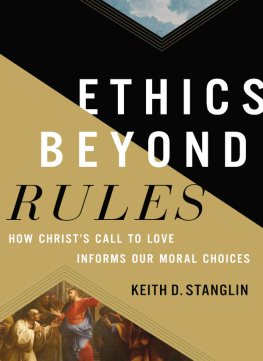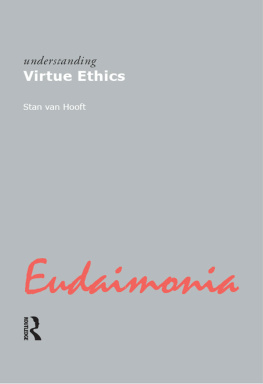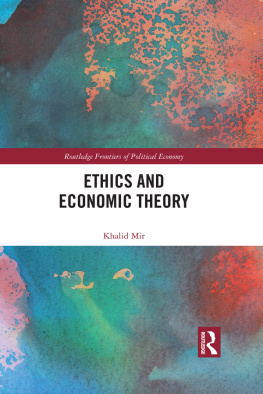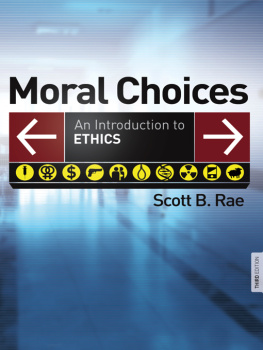ETHICS IN ECONOMICS
AN INTRODUCTION TO MORAL FRAMEWORKS
Jonathan B. Wight
STANFORD ECONOMICS AND FINANCE
An Imprint of Stanford University Press
Stanford, California
Stanford University Press
Stanford, California
2015 by the Board of Trustees of the Leland Stanford Junior
University. All rights reserved.
No part of this book may be reproduced or transmitted in any form or by any means, electronic or mechanical, including photocopying and recording, or in any information storage or retrieval system without the prior written permission of Stanford University Press.
Special discounts for bulk quantities of titles in the Stanford Economics and Finance imprint are available to corporations, professional associations, and other organizations. For details and discount information, contact the special sales department of Stanford University Press. Tel: (650) 736-1782, Fax: (650) 736-1784
Printed in the United States of America on acid-free, archival-quality paper
Library of Congress Cataloging-in-Publication Data
Wight, Jonathan B., author.
Ethics in economics : an introduction to moral frameworks / Jonathan B. Wight.
pages cm
Includes bibliographical references and index.
ISBN 978-0-8047-9328-5 (cloth : alk. paper) ISBN 978-0-8047-9453-4 (pbk. : alk. paper)
1. EconomicsMoral and ethical aspects. I. Title.
HB72.W537 2015
174'.4dc23
2014036162
ISBN 978-0-8047-9456-5 (electronic)
Typeset by Thompson Type in 10/15 Sabon
To John Mort Morton
Dum inter homines sumus, colamus humanitatem.
As long as we are among humans, let us be humane.
SENECA
Contents
Figures
Acknowledgments
MY EARLY INTEREST IN ETHICS IN ECONOMICS was aroused by experiences growing up in Africa and Latin America. Economic matters were enveloped in concerns about justice and human rights, and I quickly learned what Douglass North, Ronald Coase, and others have since proposed, that the thoughtful practice of economics and public policy cannot be isolated from institutions, history, culture, and path dependency. One important institution is the ethical framework within which economic life unfolds.
As a student, I had the good fortune of working for Rendigs Fels, who exposed me to pluralist ethics in economics. Fels and Stephen Buckles were the authors of Casebook of Economic Problems and Policies: Practice in Thinking, 5th edition (St. Paul, MN: West Publishing, 1981). This book influenced me because of the careful way it focused on the multiple values that should always be analyzed in considering public policies. My book goes further in giving recognition to pluralist principles in addition to values.
The idea for this book originated in a grant that John Mort Morton and I received from the John Templeton Foundation in 2005, via the National Council on Economic Education (today the Council for Economic Education). The grant allowed a group of scholars to gather for a conversation about what economics teachers should know about ethics. One of the things we discovered is the paucity of resources for teachers on this subject. We subsequently put together a book of lesson plans called Teaching the Ethical Foundations of Economics (2007). A large debt is owed to those authors, to the Templeton Foundation, and to the teachers who tested and used the plans in the classroom. A particularly strong acknowledgment is owed to Mort Morton, to whom this book is dedicated, for his inspiration, leadership, and support over many years.
Although teachers now had a resource, a problem remained in that few textbooks were of the length and style to appeal to undergraduates. Charles Wilber (formerly of Notre Dame) and I decided to tackle that problem by cowriting a book. We eventually headed our separate ways as authors, but Chucks vision and principles remain an important part of my commitment to this project.
My department chairs, Bob Schmidt and Dean Croushore, generously provided me the opportunity to teach a dedicated class every fall on Ethics and Economics. Most of the chapters in this book received insights and criticisms from students going back to 2006, and several deserve particular mention: Devin Ralston, Justin Weiss, Flemming Schneider, Vance Pilkington, and Nabila Rahman. Coinstructing my first teaching of this subject with colleague Douglas Hicks also made it easier. Some chapters were presented at conferences and workshops, and I am grateful to The Association for Social Economics for providing an exciting and invigorating group in which to test out ideas. The Association for Private Enterprise Education likewise offered a productive atmosphere for thinking about ethics in economics.
Many chapters in this book draw on ideas from Adam Smith. The Liberty Fund played an important role in enhancing my understanding of Smith through its seminar programs and its publications in print and on-line; this support led to a prior book, Saving Adam Smith: A Tale of Wealth, Transformation, and Virtue (2002). A market without morals makes little sense to the man whose major work, The Theory of Moral Sentiments (1759), was to understand the instinctive bonds of social cooperation.
In 2009 the University of Richmond provided funds for a Symposium on Emotions, Natural Selection and Rationality (co-organized with Elias Khalil), which provided insights used in . I am indebted to Khalil, Paul Zak, and others for that experience. In 2010 the University of Richmond launched a major in Philosophy, Politics, Economics and Law (PPEL). I have benefited greatly from its faculty and its first director, philosopher David Lefkowitz.
A number of colleagues and friends added immensely to my understanding of ethics and economics. George DeMartino published The Economists Oath: On the Need for and Content of Professional Economic Ethics (2011), which bolstered my conviction that the market was ready for the contents of this book. For fourteen years, Sandra Peart and David Levy have provided a yearly Summer Institute on the History of Economic Thought. Here we heard from James Buchanan about his longstanding interest in ethical issues. Vernon Smith also came to campus and has been a source of inspiration and support. Deirdre McCloskey, long a champion of Adam Smith and virtue ethics, provided continued sustenance at conferences. David Colander has likewise been generous with his time and ideas. David Warsh, the economic journalist (www.economicprincipals.com/), has kept ethics in economics in his crosshairs.
Scott Davis helped lead a cross-disciplinary campus reading of Smiths The Theory of Moral Sentiments (along with the late Clarence Jung) way back in 19951996. He also graciously read this manuscript and made many useful suggestions. Mark White, at the College of Staten Island, read the manuscript and particularly helped refine my treatment of Kantian ethics. He is also the co-founder of the blog, Economics and Ethics (www.economicsandethics.org/). Jonathan Anomaly read the entire manuscript with a fine editing eye and made numerous valuable suggestions. David George and Jonas Feit also read the entire manuscript and added helpful suggestions. Erik Craft read several chapters with a keen eye and insightful comments.
I am grateful to the following additional colleagues and friends who assisted on parts of the project, with the usual disclaimer of liability: Al Barrera, Jason Brennan, Marty Calkins, Joanne Ciulla, Richard Dagger, Rob Dolan, Tricia Fanney, Jack Fiedler, Rob Garnett, Jim Hall, Tim Hamilton, Robert Hetzel, Dan Hausman, Rob James, Linda MacCammon, Tim Madigan, Shakun Mago, KimMarie McGoldrick, Julie Nelson, Rob Phillips, Terry Price, Mason Schreck, Clair Smith, and Jean McNall Wight.
Finally, I want to thank my editor at Stanford University Press, Margo Beth Fleming, for her wonderful support, James Holt for able editorial assistance, and Margaret Pinette for valuable manuscript editing.
Next page





